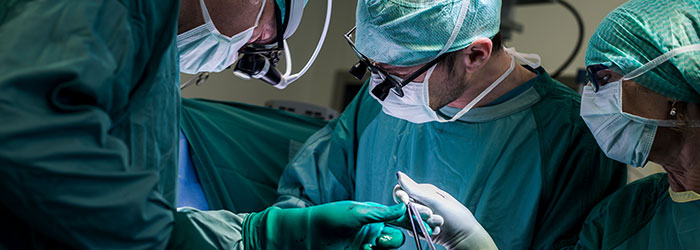
At LewisGale Physicians, our cardiothoracic surgeons provide patients with advanced surgical options to treat conditions of the heart, lungs and peripheral vascular system. We understand surgery can be overwhelming, and that’s why our team supports you throughout your entire treatment, from preoperative to postoperative care. We also provide a patient-centered atmosphere with the goal of making you feel comfortable about your treatment plan and procedure.
To schedule an appointment, ask your physician for a referral or call our office at (540) 776-2020.
How healthy is your heart?
Understanding your heart health is a valuable preventive care tool. Take our assessment to determine your risk of heart disease and next steps to take.
Heart and value procedures we perform
- Aortic and artery disease
- Aortic aneurysm and dissection repair
- Aortic dissection repair
- Aortic valve repair and replacement
- Atherosclerosis treatment
- Carotid artery disease repair
- Congenital heart lesions repair
- Coronary artery bypass
- Heart abnormality procedures
- Heart failure treatment
- Heart muscle inflammation treatment
- Implantable cardioverter defibrillator
- Minimally invasive heart surgery
- Mitral valve repair and replacement
- On and off-pump artery bypass grafting
- Transcatheter aortic valve replacement for aortic stenosis
- Valvular stenosis
Thoracic (lung) procedures
- Chest fluid removal
- Collapsed lung treatment
- Embolectomy/thrombectomy
- Mediastinoscopy
- Minimally invasive reconstruction of the sternum
- Open and minimally invasive lung resections
- Pulmonary valve repair
- Rib removal
- Resection of mediastinal masses
- Thoracoscopy
- Treatment for rib and sternum fractures
Peripheral vascular disorders
- Balloon angioplasty / stenting
- Bypass grafting
Frequently performed procedures
Coronary bypass surgery
Coronary artery bypass grafting (CABG) is performed on patients with significant blockages in their arteries. This surgery can often prevent patients from having heart attacks.
Heart valve repair surgery
Heart valve repair is a procedure to correct a damaged or diseased valve. Conditions that may cause heart valve dysfunction are stenosis and regurgitation, also known as a leaky valve. Several different procedures may be performed to repair a valve, depending on the source of the valve problem.
Heart valve replacement surgery
Heart valve replacement is used when a defective valve cannot be repaired. The patient’s age is one of the most important factors when making the decision between a mechanical and tissue valve.
Mechanical heart valves
Mechanical heart valves are typically made of metal, carbon and artificial materials. These valves are durable, and structural failure is very rare. While the long-term durability of a mechanical valve is excellent, they do require life-long blood-thinner therapy to prevent clots forming on the valve.
Tissue heart valves
Tissue or bioprosthetic valves are made from pig tissue, cow tissue, or pericardia tissue from other species. They may also have some artificial parts to provide additional support and allow the valve to be sewn in place. Typically, these valves do not require the ongoing use of blood-thinner pills, however, these valves may gradually deteriorate and require a repeat operation for removal and re-replacement.
Minimally invasive heart surgery
When possible, our surgeons perform minimally invasive heart surgery. This procedure results in a smaller incision underneath the breast rather than a traditional incision that spans vertically down the chest.
Thoracic surgery
Our thoracic surgery team provides comprehensive diagnosis and surgical care to patients with diseases of the lungs, trachea, esophagus, diaphragm, chest wall and mediastinum. Diseases treated by our thoracic surgeons include lung cancer, benign pulmonary nodules, emphysema, inflammatory disease of the mediastinum, pleural infection and other diseases affecting the lungs and thoracic area.
Minimally invasive robotic surgery
When possible, our surgeons use advanced robotic technology. This means our surgeons can perform extremely complex thoracic operations with greater precision and control
